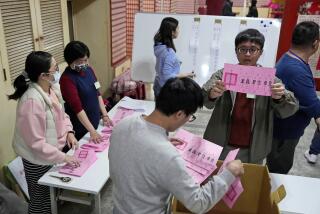China’s ‘Brainwashers’ Have Lost Control
- Share via
Having suppressed the democracy movement and sentenced some of its leaders to death, the Chinese Communist regime is still not satisfied. It is attempting an instant rewriting of history: The massacre by the People’s Liberation Army of nonviolent protesters is depicted as an assault on that army by “counterrevolutionary” and “criminal” elements.
Perhaps even more significant, it has announced its intention to reinstitute large-scale programs of “political education,” and to require all university graduates to spend a year or two laboring in rural areas.
One feels a kind of historical deja vu in all this. During the decade or so following the Communist takeover in 1949, political education became the basis for a startling series of national campaigns of “thought reform” or “ideological remolding,” loosely referred to in the West as “brainwashing.” I was able to study the process by means of psychological interviews with Chinese who had been subjected to thought reform at universities or special “revolutionary colleges,” and with Westerners who had been put through it in prisons.
Thought reform was a blend of coercion and exhortation. It included an elaborate personal confession, a structured rendition of past sins or crimes made under the intense pressure of group criticism and self-criticism and sustained “reeducation,” a prescribed personal change that enabled one to embrace and live out the imposed belief system.
While derived partly from practices of Soviet communism, thought reform was essentially a Chinese creation that drew heavily on traditional cultural practices, including the Confucian principle of “rectification” or correction of individual shortcomings. It was to become a trademark of the Chinese Revolution, and its application to virtually the entire population--to hundreds of millions of people--was one of the most powerful efforts at human manipulation ever undertaken.
Does that early period of the regime resemble the present situation? In 1951-’52, when they carried out their thought reform campaign, the Chinese Communists had achieved a near mythic aura, as embodied by their leader, Mao Tse-Tung. Not only had they won a brilliant military victory over the unpopular and corrupt Nationalist government, but they had deeply impressed the Chinese people with their honesty, dedication to ideals and personal sacrifice. They could bring authority to their accusations of “selfish individualism” in thought-reform participants and provoke in them strong feelings of guilt and shame as a powerful lever of psychological influence.
During that phase of its history, moreover, China was relatively isolated from the rest of the world. The regime could create its own environments and dominate all communication within them.
Thought reform did appear to succeed with many people, and for many others it provided clear guidelines for permissible beliefs and actions in the new China. Yet even then I found evidence of a significant minority who were alienated rather than converted.
In fact, one of the reasons Mao initiated the Cultural Revolution during the late 1960s was the declining ideological intensity he observed among both the people and their rulers. Nor was that decline overcome by the crude versions of thought reform applied at the time, accompanied as they were by large-scale violence and radical interruption of lives and institutions throughout the society.
In assuming leadership in the late 1970s, Deng Xiaoping did much to open China up, especially in economic areas, while downplaying ideology in general and desanctifying Mao in particular. One could now engage Chinese students, teachers and professionals in frank discussion of their tribulations during the Cultural Revolution and their confident hope for continuing liberalization. They also told of diminishing political education sessions, and of attitudes of informality and even ridicule when they did take place.
Over the course of the 1980s, students increasingly found their own public voice and vented their dissatisfaction with the regime’s continuing suppression of thought, its spreading corruption and its slow pace of change. All of this culminated in the extraordinarily moving demonstrations this past spring in Tian An Men Square.
What those demonstrations made clear--what Deng and his circle could not accept--was that the minds of large segments of the Chinese people, and especially those of the young, belonged not to their government or to the Communist Party, but to themselves. For Deng, Chinese minds had slipped out of control.
Can the regime now reeducate its critics to believe in its own decency and virtue--that is, bring Chinese minds back under control? In my view, it cannot. In reforming others, it can no longer set a believable standard of idealism and incorruptibility--not even one of moral legitimacy. Those being reformed, even when complying, are likely to experience resentment toward the regime rather than strong feelings of self-blame necessary for genuine change.
More than that, there is simply no possibility that China will again isolate itself. China needs the outside world economically, and important footholds of international communication have been established there. The forms of communication so important to the democracy movement--direct and indirect exchanges between Chinese and foreigners, telephone, broadcast and fax connections with much of the world, all of that can hardly be eliminated.
Specific thought-reform programs, of course, can be sealed off from the outside, but people emerging from them into the larger Chinese environment will quickly encounter alternative, frequently antagonistic, ideas and attitudes.
Finally, there is the most fundamental limitation of all. Thought reform and related procedures on the part of its imitators elsewhere in the world are never infallible. They can cut deeply into the individual psyche, bring about profound inner confusion and even achieve and maintain conversions within environments that are both closed and compelling. But human beings, when permitted the slightest opening, can once again respond to their own experiences and seek their own truths.
More to Read
Sign up for Essential California
The most important California stories and recommendations in your inbox every morning.
You may occasionally receive promotional content from the Los Angeles Times.













